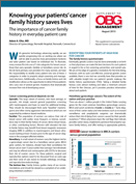
Medical Education Library
Knowing your patients’ cancer family history saves lives
Publish date: August 3, 2013
This supplement is sponsored by Myriad Genetic Laboratories.
Author and Disclosure Information
Adam A. Ofer, MD
Director of Gynecology, Norwalk Hospital, Norwalk, Connecticut
Dr. Ofer reports that he is a speaker for Myriad Genetic Laboratories

